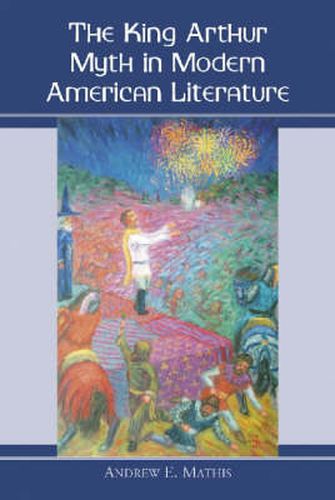Readings Newsletter
Become a Readings Member to make your shopping experience even easier.
Sign in or sign up for free!
You’re not far away from qualifying for FREE standard shipping within Australia
You’ve qualified for FREE standard shipping within Australia
The cart is loading…






This title is printed to order. This book may have been self-published. If so, we cannot guarantee the quality of the content. In the main most books will have gone through the editing process however some may not. We therefore suggest that you be aware of this before ordering this book. If in doubt check either the author or publisher’s details as we are unable to accept any returns unless they are faulty. Please contact us if you have any questions.
In American fiction, two forms of the Arthurian myth are commonly found: the use of the myth for politics reasons, and the use of the myth for the continuation of an aesthetic tradition that can be traced back to the earliest use of the Arthurian cycle by writers in the British Isles. This work traces the use of the legend from Mark Twain’s A Connecticut Yankee in King Arthur’s Court to Donald Barthelme’s novel The King. It discusses how Twain used the myth to take a stand against England, how it served cultural and aesthetic purposes in John Steinbeck’s writing, how Raymond Chandler used it in complex texts with less obvious Arthurian allusions that carried strong cultural and even political associations, how John Gardener used aspects of the myth to embellish already existing narrative structures and to underscore philosophic debates, and how Donald Barthelme suggests the continuing interest of American writers in the Arthurian legend today in his novels. Also discussed is the effect of World War II on American literature and the Arthurian myth and the Camelot image surrounding the Kennedys.
$9.00 standard shipping within Australia
FREE standard shipping within Australia for orders over $100.00
Express & International shipping calculated at checkout
This title is printed to order. This book may have been self-published. If so, we cannot guarantee the quality of the content. In the main most books will have gone through the editing process however some may not. We therefore suggest that you be aware of this before ordering this book. If in doubt check either the author or publisher’s details as we are unable to accept any returns unless they are faulty. Please contact us if you have any questions.
In American fiction, two forms of the Arthurian myth are commonly found: the use of the myth for politics reasons, and the use of the myth for the continuation of an aesthetic tradition that can be traced back to the earliest use of the Arthurian cycle by writers in the British Isles. This work traces the use of the legend from Mark Twain’s A Connecticut Yankee in King Arthur’s Court to Donald Barthelme’s novel The King. It discusses how Twain used the myth to take a stand against England, how it served cultural and aesthetic purposes in John Steinbeck’s writing, how Raymond Chandler used it in complex texts with less obvious Arthurian allusions that carried strong cultural and even political associations, how John Gardener used aspects of the myth to embellish already existing narrative structures and to underscore philosophic debates, and how Donald Barthelme suggests the continuing interest of American writers in the Arthurian legend today in his novels. Also discussed is the effect of World War II on American literature and the Arthurian myth and the Camelot image surrounding the Kennedys.